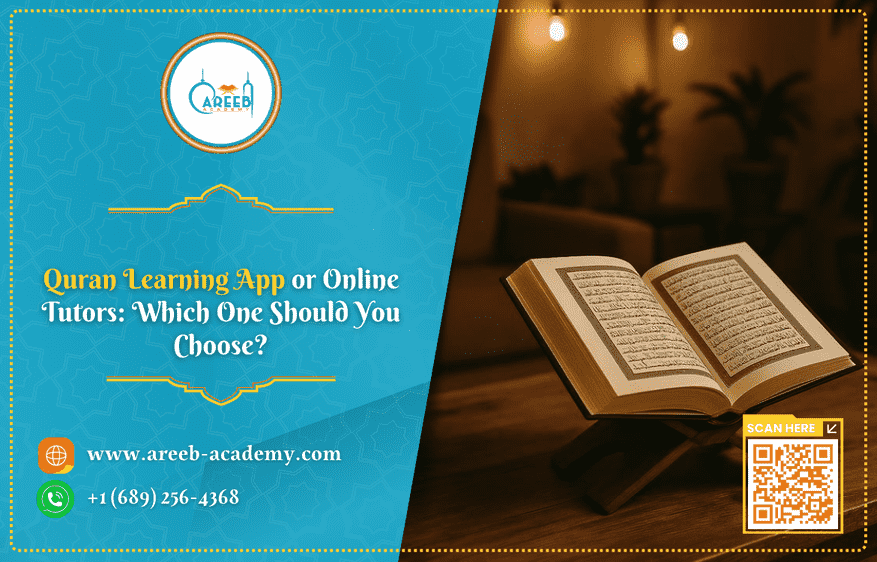
In today’s digital world, learning the Quran has become more accessible than ever before. With the rise of Quran learning app and the availability of online Quran tutors, students now have multiple ways to connect with the Book of Allah. But which option is truly better? While apps provide flexibility and engaging tools for self-study, online tutors offer human interaction, personalized feedback, and structured guidance. Each method has its strengths, and the choice depends on your learning goals, lifestyle, and level of commitment.
This article explores the differences between a Quran learning app and online tutors, their benefits, challenges, and how to decide which option suits you best.
What Is Quran Learning App?
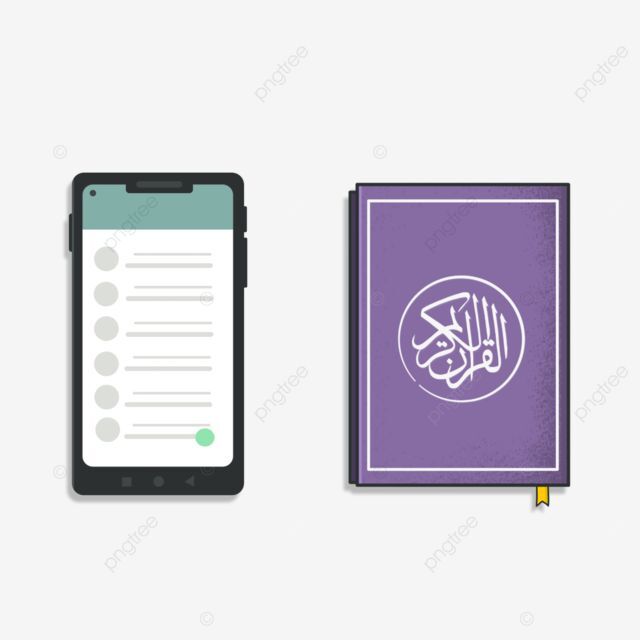
Quran learning app is a digital tools designed to help Muslims of all ages study the Quran through their smartphones, tablets, or computers. These apps often include features such as audio recitation, digital Mushaf, Tajweed lessons, interactive quizzes, and memorization support. The idea behind them is to make Quranic learning more accessible, engaging, and flexible, whether you’re a busy adult trying to reconnect with the Quran or a parent looking for fun ways to introduce your child to recitation.
Instead of being limited by time, place. Quran learning app allows learners to practice anytime and anywhere, serving as a helpful companion to traditional study or online tutoring.
What Are Online Quran Tutors?
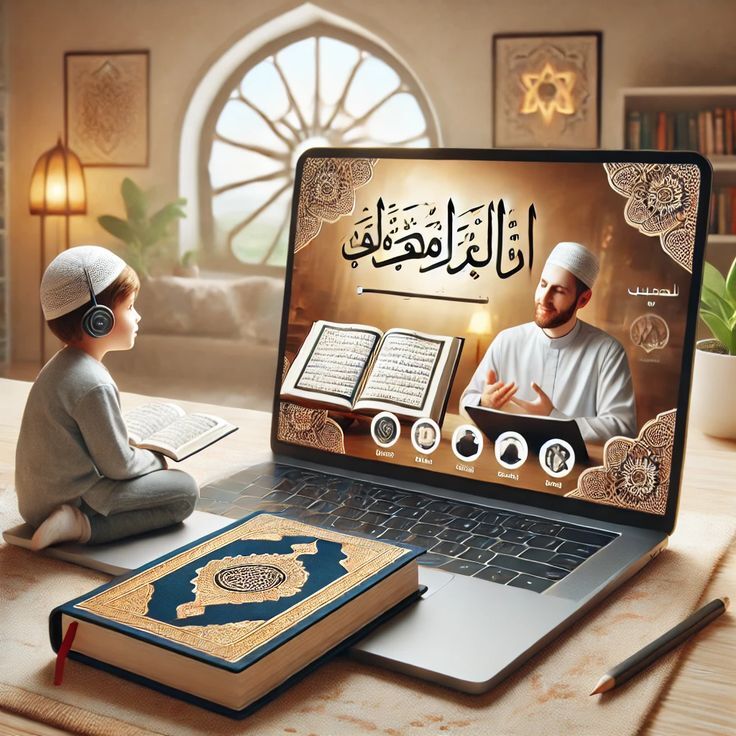
Online Quran tutors play a vital role in making Quranic learning accessible and effective. Unlike mobile applications that rely on self-study, tutors provide personalized guidance, correcting mistakes instantly and ensuring students develop proper Tajweed, accurate recitation, and deeper understanding.
With online tutors, learners benefit from interactive one-on-one sessions, flexible scheduling, and personalized guidance from teachers who adapt lessons to each student’s level and pace. Whether it’s a child starting with short surahs or an adult aiming to perfect Tajweed, having a live tutor makes the learning journey more engaging and structured.
In addition, online Quran tutors build a human connection that applications cannot replace; offering encouragement, answering questions in real time, and nurturing a love for the Quran that goes beyond memorization.
Key Differences Between Quran Learning App and Online Tutor?
While both Quran learning app and online tutors aim to make Quranic education more accessible, the learning experience they provide is very different. Understanding these differences can help learners (and parents) choose the right option for their needs.
1. Personalized Feedback and Correction (Quran Learning App Vs Online Tutors)
- Quran Learning App: Most apps provide pre-recorded audio or automated lessons. While these are useful for practice, they cannot identify mistakes in Tajweed, pronunciation, or recitation style.
- Tutors: Online tutors listen to recitation in real-time and offer immediate corrections. This ensures the student learns the Quran accurately and avoids reinforcing mistakes.
When it comes to Tajweed and proper pronunciation, human correction is irreplaceable.
2. Flexibility vs. Structured Guidance (Quran Learning App Vs Online Tutors)
- Quran Learning App: They offer complete flexibility—students can learn anytime, anywhere, and at their own pace. However, this freedom can sometimes lead to inconsistency or lack of discipline.
- Tutors: A tutor creates a personalized learning plan, sets goals, and ensures regular practice. This structure helps students stay committed and motivated, which is especially important for long-term learning like Quran memorization.
Our Academy combine the best of both worlds. With one-to-one online classes, learners enjoy the same flexibility as apps—choosing times that suit their schedules and progressing at their own pace—while still receiving the structured guidance and accountability of a qualified tutor. This balance makes learning both flexible and effective.
Apps give freedom, tutors provide accountability, and our one-to-one learning model gives you both together.
3. Human Connection and Motivation
- Quran Learning App: Learning through an app is often a solo experience, which can feel isolating over time. Motivation depends entirely on the learner’s self-discipline.
- Tutors: Quranic learning is not just about memorizing verses—it’s about building a spiritual and emotional connection. Tutors can inspire, encourage, and even act as mentors who guide students in both knowledge and character.
Human interaction adds warmth, encouragement, and understanding to the learning journey.
4. Depth and Scope of Knowledge
- Quran Learning App: Most Quran Learning App focus on the basics; letters, pronunciation, short Surahs, and simple quizzes. They are great for beginners but limited in depth.
- Tutors: Online tutors go beyond recitation. They can explain Tajweed rules, Tafsir, and Islamic values, ensuring the student gains a more holistic understanding of the Quran.
Apps provide surface-level learning, while tutors guide toward deeper knowledge and practice.
5. Adaptability to Individual Needs
- Quran Learning App: Content is usually standardized—the same lessons for everyone. Learners may struggle if they progress slower or faster than the app’s structure.
- Tutors: A tutor can adapt instantly to the learner’s needs, whether that means repeating a lesson, slowing down for clarity, or accelerating when the student is ready for more.
Tutors make learning personal and adaptable, while apps remain fixed.
Which Option Is Better for Kids?

When it comes to children, learning with an online Quran tutor is usually the better choice compared to relying solely on Quran Learning App. While apps may seem fun and engaging with games, sounds, and visuals, they lack the human interaction that children need at an early stage of learning.
1. Personal Interaction and Encouragement
Children thrive on personal attention. An online tutor can:
- Gently correct mistakes in pronunciation and Tajweed.
- Offer encouragement when a child feels unmotivated.
- Use a kind, patient approach that builds a positive connection with the Quran.
This supportive environment helps children feel motivated and valued, something that an app simply cannot replicate.
2. Customized Pace of Learning
Every child learns differently. A skilled tutor can:
- Adapt the pace of lessons according to the child’s abilities.
- Spend more time on areas where the child struggles.
- Move forward once the child is confident, ensuring steady progress without pressure.
This one-on-one attention helps children stay engaged without feeling overwhelmed or left behind.
3. Building Confidence and Love for Learning
With the right tutor, Quran learning becomes more than just memorization, it turns into an enjoyable journey. Tutors help children:
- Develop a love for reciting the Quran.
- Gain confidence in their abilities through consistent practice.
- Learn discipline and respect for the Quran in a nurturing way.
This combination of knowledge, confidence, and love lays the foundation for a lifelong connection with the Quran.
4. Role of Quran Learning App in Children’s Learning
This doesn’t mean apps have no role. In fact, they can be an excellent supplementary tool. For example:
- Apps can provide extra practice outside class time.
- Interactive quizzes can make revision fun and engaging.
- Audio features allow children to listen and repeat verses on their own.
However, apps should be viewed as a support system, not the main source of learning.
How to Choose the Right Online Quran Tutor for You
Finding the right online Quran tutor is one of the most important steps for a meaningful and lasting learning experience. Whether you are seeking Quran lessons for a child or as an adult learner, the tutor you select will directly influence your accuracy, motivation, and connection with the Quran. Below are key factors to consider when making this decision.
1. Qualifications and Expertise

A strong Quran tutor should have recognized credentials in:
- Recitation (Qira’ah): Ensuring accurate pronunciation of every letter.
- Tajweed Rules: Teaching how to recite the Quran beautifully and correctly.
- Hifz (Memorization): Guiding students through structured memorization with effective techniques.
- Islamic Studies (Optional): For those who want deeper knowledge, some tutors also teach Tafsir, Hadith alongside recitation.
Always verify the tutor’s educational background or ijazah (certification) before starting.
2. Teaching Style and Adaptability
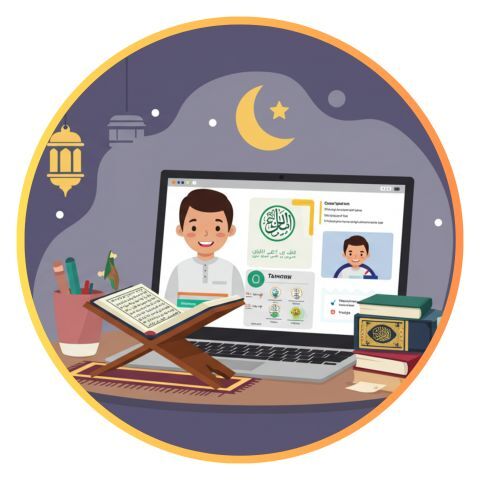
Every learner is different, so the best tutor is one who can adapt their teaching approach to:
- Children: Making lessons engaging and interactive.
- Adults: Focusing on clear explanations and practical application.
- Beginners: Starting from the Arabic alphabet and basics.
- Advanced learners: Offering in-depth Tajweed and memorization strategies.
Flexibility ensures the lessons are not “one-size-fits-all,” but tailored to your needs.
3. Consistent Feedback and Progress Tracking

Learning the Quran is not just about attending classes—it’s about improving step by step. A reliable tutor will:
- Correct mistakes immediately during recitation.
- Provide weekly or monthly progress updates.
- Assign revision tasks to strengthen memory and fluency.
- Motivate students when progress feels slow.
This ongoing guidance keeps learners on track and prevents them from developing bad habits in recitation.
4. Communication and Language Skills

Effective learning requires clear communication. The tutor should:
- Speak the student’s preferred language (Arabic, English, etc.) for explanations.
- Use simple, clear instructions; especially for beginners.
- Be approachable and patient, creating a comfortable learning environment.
When the student feels understood, the learning experience becomes smoother and more enjoyable
5. Character and Mentorship
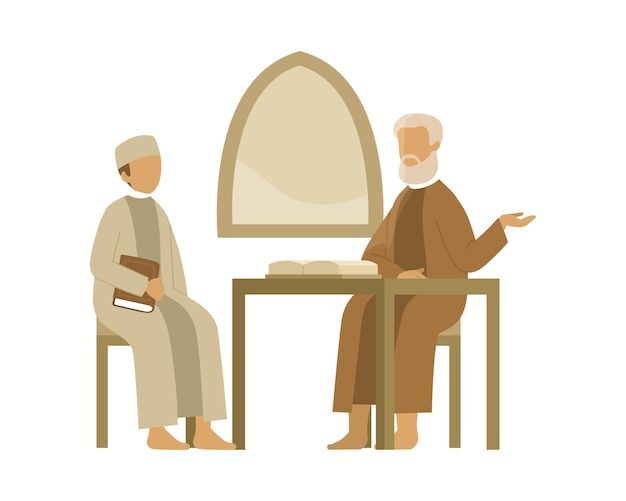
The right Quran tutor is not just a teacher but also a mentor and role model. Beyond lessons, a great tutor will:
- Inspire love for the Quran and connection to faith.
- Encourage discipline, patience, and respect.
- Motivate the learner during challenges.
- Build a relationship based on trust and encouragement.
A true tutor combines knowledge with character, guiding both the tongue in recitation and the heart in faith.
Can Quran Learning App Support Kids’ and Adults’ Learning?
In today’s digital age, Quran learning app has become increasingly popular for both children and adults. They provide a convenient way to access Quranic content anytime and anywhere, making them an appealing option for learners with busy schedules. But how effective are they on their own, and when should they be combined with a tutor?
1. Benefits of Quran Learning App
Quran apps offer several features that make them valuable for learners of different ages:
- Flexibility: Learn at your own pace, whether during travel, short breaks, or after school/work.
- Interactive Learning: Many apps include games, quizzes, and progress tracking that help maintain motivation, especially for children.
- Instant Feedback: Built-in voice recognition and recitation tools highlight mistakes and allow learners to self-correct.
- Wide Content Range: Some apps include Tajweed tutorials, Tafsir explanations, and even memorization tracking, which can enrich the learning journey.
These features make apps a useful supplement to structured Quran study.
2. Limitations of Quran Learning App
Despite their advantages, Quran apps are not a complete replacement for human instruction. Key limitations include:
- Lack of Personal Interaction: Apps cannot offer the encouragement, warmth, and moral guidance that a human teacher provides.
- Limited Correction: Automated feedback may not catch subtle Tajweed errors or tone variations.
- Motivation Challenges: Without accountability, learners—especially children—may lose consistency.
- One-Size-Fits-All: Quran Learning App may not adapt to individual learning needs, age, or ability.
This means learners can miss out on the deeper, personalized aspects of Quranic education.
3. Best Approach: Combining Quran Learning App with Tutors
The most effective strategy is a balanced approach:
- For Kids: Use apps for short daily practice and games, while relying on a tutor for proper recitation, Tajweed correction, and motivation.
- For Adults: Apps can be a great way to revise or learn independently, but a tutor ensures accuracy and keeps progress on track.
By combining the two, learners benefit from the convenience of apps and the personalized guidance of tutors—resulting in a complete, effective Quran learning experience.
Common Challenges Learners Face in Learning the Quran Online
Online Quran learning has opened doors for students across the globe, but like any method, it comes with challenges. Both children and adults may encounter obstacles that can slow down their progress if not addressed.
1. Distractions and Lack of Consistency
- Busy schedules: Juggling school, work, or family responsibilities often makes it hard to attend classes regularly.
- Home environment: Background noise or multitasking can break concentration during lessons.
Solution: Establish a fixed study time, create a quiet learning space, and treat online classes with the same importance as in-person sessions.
2. Maintaining Focus During Screen Sessions
- Long sessions in front of a screen can cause fatigue, especially for children.
- Attention spans are shorter online compared to face-to-face learning.
Solution: Opt for shorter, engaging lessons with interactive elements. Tutors who use stories, visuals, and Q&A can help maintain focus.
3. Technical Issues
- Poor internet connection, audio lag, or device breakdowns can interrupt the learning flow.
- These problems can cause frustration and loss of motivation.
Solution: Ensure a reliable internet connection, keep backup devices if possible, and choose platforms known for stability and ease of use.
4. Balancing Technology with Human Interaction
- Apps and online resources are helpful but cannot fully replace the guidance of a teacher.
- Without a tutor’s encouragement, learners may feel disconnected or demotivated.
Solution: Use apps for reinforcement but rely on a qualified tutor for correction, accountability, and deeper understanding.
Final Thoughts
Both Quran learning apps and online tutors bring unique benefits to today’s learners. Quran Learning App makes it easier to practice anytime and anywhere, while online tutors ensure personalized guidance, correction, and motivation. Instead of viewing them as competitors, you can see them as complementary tools. Quran Learning App for flexibility and self-practice, and tutors for structured, one-to-one learning.
The key is to choose what fits your lifestyle and goals. Whether you want to strengthen your Tajweed, memorize the Quran, or help your child build a solid foundation, investing in the right support will make your journey more effective and rewarding.
Learning the Quran is more than just memorization — it is an act of worship, guidance, and connection with Allah. As Allah commands: “And recite the Quran with measured recitation” (Quran 73:4). And the Prophet Muhammad ﷺ reminded us: “The best among you are those who learn the Quran and teach it” (Bukhari).
At Areeb Academy, we are honored to help you be among the best — by learning, practicing, and passing on the Quran with love and excellence.
Ready to start your Quran learning journey?
At Areeb Academy, we provide one-to-one online Quran classes with qualified tutors who make learning engaging, structured, and tailored to your pace. Whether you’re a beginner, an adult learner, or want your child to develop strong Quranic foundations, our tutors are here to guide you.
Book your free trial session today and experience the difference of personalized Quran learning!
FAQs
1. Can Quran learning apps replace online tutors completely?
Not really. Apps are great for practice and flexibility, but they can’t provide real-time correction or personalized motivation like a tutor does.
2. Are online Quran tutors suitable for both kids and adults?
Yes, online tutors adapt their teaching methods for different ages and levels, making them ideal for children, adults, and even complete beginners.
3. How do I know if I should choose an app or a tutor?
If you’re self-disciplined and want flexible practice, apps work well. But if you need structured lessons, corrections, and guidance, a tutor is the better option.
4. Can I combine both apps and tutors for better learning?
Absolutely! Many learners use apps for practice between sessions while relying on tutors for deeper understanding and correction.
5. What makes one-to-one Quran learning special?
It ensures personal attention, flexible scheduling, and lessons adapted to your pace and goals—something apps alone cannot provide.


